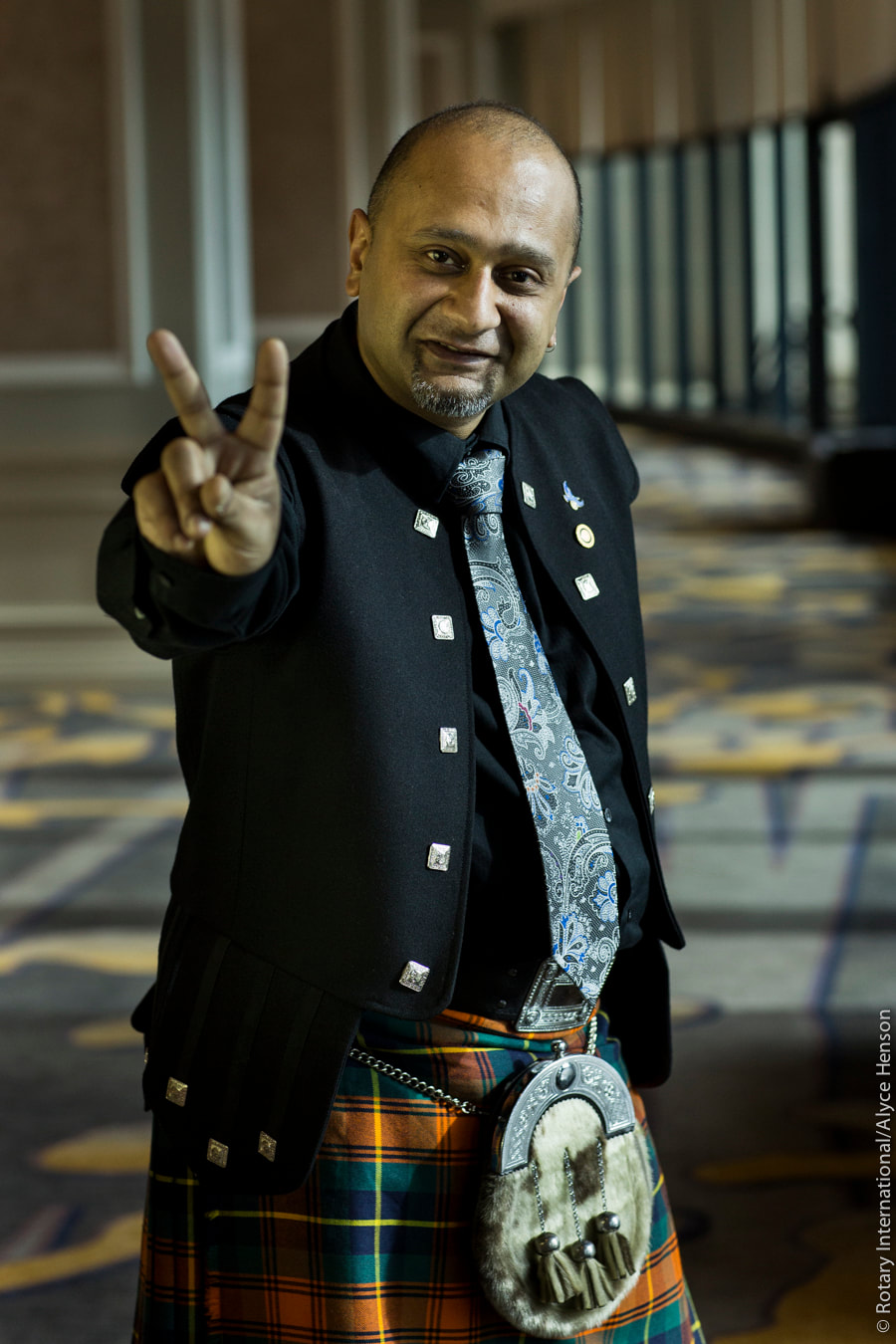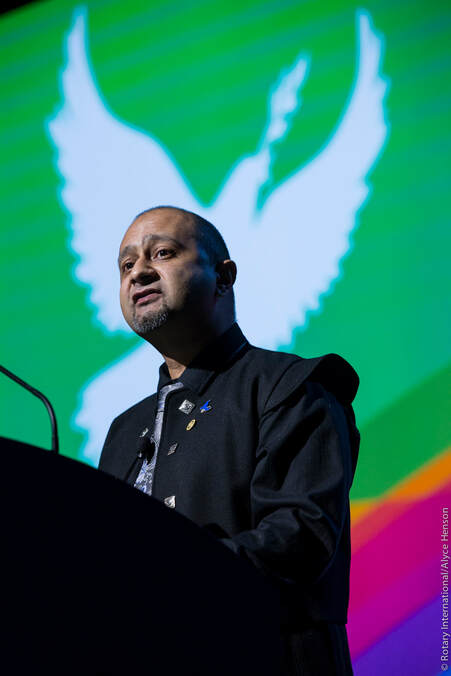Namaste, y'all.
|
Kiran Singh Sirah has always described himself as a citizen of the world. Raised in the United Kingdom, Kiran was born in England. His mother was born in Kenya, his father in India, and his brother in Uganda. He has often described his family as a “mini United Nations,” joking that in England, he was Indian; in Scotland, he was English; and in the U.S., he’s British or sometimes European. Each of these identities reflects the truth in a different way.
Kiran learned the power of stories early in life, when his parents told him vivid tales about the country they had fled under threat of genocide before he was born. As a child preparing meals with his mother in their kitchen at home, he learned about what her childhood had been like in East Africa. He learned about people he had never met, like the freedom activists in the rural village of Punjab, in India, where his grandparents were from. These were stories of places he wouldn’t see in person until he was much older, but they taught him about resilience, strength, and love. Kiran received his first lesson about the power of storytelling to heal conflict at a very young age. As one of the only brown boys in his small seaside town, he got a lot of grief on the playground. Knowing the trouble he faced, his mother would encourage him to tell those children about the stories she had told him. She wanted him to tell the bullies who he really was. It helped, and became an early model for how he would use stories to help marginalized communities as an adult. Through his early career as a peacebuilder, an educator, and a museum administrator, Kiran looked for ways to help troubled kids express themselves. Stories are a powerful act of self-articulation. But equally important, stories also change the listener. They can’t exist without an audience. Stories are, fundamentally, a dialogue that promotes empathy, multiculturalism, and understanding. Across his career, Kiran has worked hard to promote such dialogue. As a curator of education at the National Museum of Scotland, he worked with teens who were first-time offenders. Usually police made these kids do community service chores. Instead, he created a program where the kids could use their graffiti-tagging skills to develop an artwork with a textile artist. This collaboration was a new version of something these kids had been doing on the street for many years: marking a space to let the world know that they exist. The difference was that the museum invited the kids to be a part of the community instead of existing in opposition to it. Kiran moved to the United States in as a Rotary Peace Fellow in 2011 when he began his studies at the University of North Carolina, Chapel Hill. He earned a master’s degree in folklore studies and a graduate certificate in international peace and conflict resolution. In 2013, he was hired as president of the International Storytelling Center (ISC), where he emphasized applied storytelling as political action and a vehicle for peace. He has led deep collaborations with regional health care leaders, spearheaded educational programming for at-risk youth, and launched a two-year initiative to promote the stories of African Americans across history in Appalachia, including the challenging and complex narratives of its antebellum period. For these efforts and his previous work, Kiran was named a Rotary International Champion of Peace at the United Nations headquarters in Geneva, Switzerland, in 2017. Kiran’s work positions storytelling as a real counterargument to the sense of powerlessness that so many feel when there is upheaval and conflict in their communities, whether it’s after a disaster, in politics, or during a pandemic. In 2015, after the massacre at Mother Emanuel AME church in Charleston, he led roundtable discussions and workshops for youth in Charleston as part of a healing initiative to engage the public organized by the Charleston County Public Library. In 2017, he was invited to the Pentagon to share strategies for using storytelling to preventing violence at home and abroad. In 2020, he organized and led trainings for frontline social workers and health care providers at home and abroad. Across these many different contexts, Kiran believes that storytelling is not just a force for social change; it is social change itself. It helps people connect, engenders new understanding, and inspires people to act for positive change in their communities and in society at large. Kiran is a prolific champion of storytelling and frequently travels to give talks, workshops, to mentor youth and work with grassroots communities across the nation and around the world. As a popular public speaker and storytelling leader, he often shares stories from his own life. One that he often returns to is the time long ago when, at a literary festival in Glasgow, he met an attorney who had been a speechwriter for Dr. Martin Luther King, Jr. The speechwriter told Kiran that he was a trained clarinetist, and that he’d often used music theory in his work as he drafted the speeches. He described imagining Dr. King as the instrument, and then considering composition and cadence of the words as he worked and wrote. It’s a reminder of how social justice and the arts have had a long, fruitful partnership— and how all the things we learn, the people we meet, and the places we go can be more interconnected than it might initially seem. Kiran’s current work promotes the power of storytelling as a democratic art, a core practice, and a gift of hope for people in societies that feel increasingly divided, isolated or burnt out. He has a talent for bringing different kinds of people together to connect and achieve a common goal. Working at the cutting edge of folk art preservation, social justice, education, and community building, his big ideas are matched by his passion and dedication to the hard work of realizing them one small step at a time. |
In his ten years leading the International Storytelling Center (ISC) (2013-2023) he developed a variety of new programs including Freedom Stories, Stories as Medicine, and established the More than One Story Initiative, while also steering the National Storytelling Festival through its 50th anniversary. Through his work, ISC received recognition from the National Endowments for the Arts and the Humanities, Purdue, the Mellon Foundation, South Arts, the New Pluralists, and the East Tennessee Foundation, and was promoted to among the top rank of Major Cultural Institution (MCI) for the state of Tennessee. Sirah has represented ISC at numerous world peace assemblies and developed partnerships with major cultural institutions including the Smithsonian, the United Nations, the Library of Congress, Google Arts & Culture, Dollywood, and Dolly Parton’s Imagination Library. Kiran's focuses largely on social justice, peace and community empowerment by creating safe spaces for more equitable narratives. Through his Storytelling: A Gift of Hope philosophy, he developed one of the nation’s first “narrative medicine partnerships” --which has trained over 300 healthcare staff to utilize storytelling for comfort, care, resilience and patient care. The Freedom Stories initiative, which ran from 2019-2021 and was supported by a grant from the National Endowment for the Humanities, focused on unearthing the Black heritage of Appalachia through a unique marriage of performance storytelling, humanities scholarship, and public discussion. Kiran's passion is palatable. Every lecture, workshop, training, and program always has two ideas at the fore: global peace and the stories that will get us there. As Kiran says, “Once you understand your own story matters, it’s not a large leap to understand other people’s do, too.” Kiran provides creative thought leadership to grassroots and social impact sector partners, practitioners, change-makers, justice philanthropies and foundations, in harnessing their creative potential and organizational capacity to promote peace, advance racial and social justice, and cross-cultural community empowerment dialogues. Drawing upon more than two decades as a cultural, narratives for peacebuilding specialist and non-profit leader, Kiran provides program design, mentorship and community centered approaches to build trust and empathy, that empowers others to lead transformative change - on their own terms. |
Get In Touch
Ready to make story part of your organization's culture? Want Kiran to speak at your next event?
Reach out for more information and we'll see how we can work together.
Reach out for more information and we'll see how we can work together.

